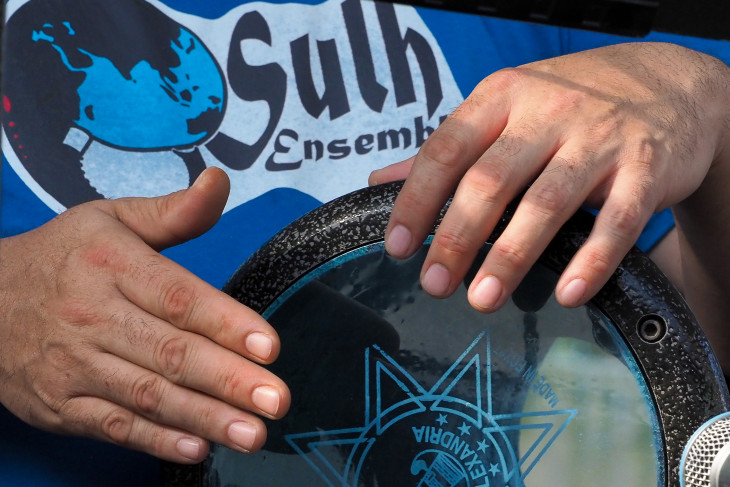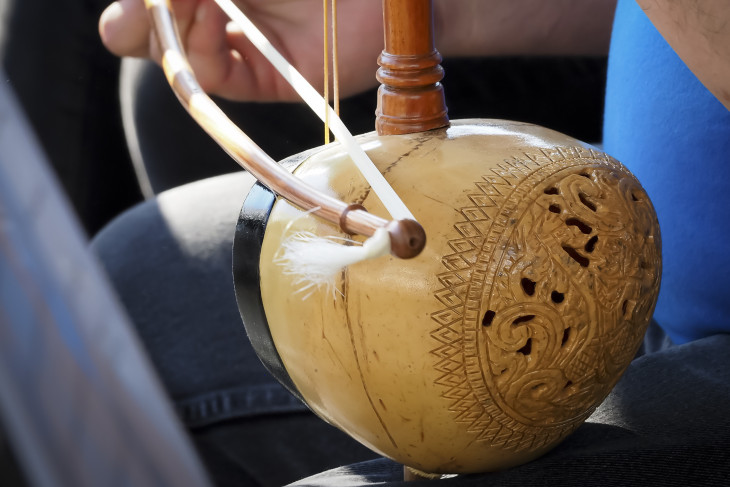Jon Silpayamanant ’96 can pick up the most obscure musical instrument and, with practice and a little guidance from the internet, can master it in no time.
A smart phone? Not so much. He managed to wipe out his entire electronic calendar and, as you read this story, you’ll understand just how devastatingly disruptive that was.
“I now have a paper schedule again,” he said.
Silpayamanant, “one of the most gifted cellists to ever enroll in the School of Music,” according to retired DePauw professor Eric Edberg, is an adjunct cello instructor at Indiana University Southeast in New Albany; a sectional coach for the Floyd County Youth Symphony and Floyd Central High School; and a workshop instructor in improvisation and world music styles at colleges, high schools, festivals and other music events.
He plays in the IUS Orchestra and the IUS Community Band, which performs big band numbers, concert works, folk tunes, jazz, pop and musical scores. He also plays music for numerous ballet and other dance troupes, including those from ethnic traditions.

He is a founding member of Il Troubadora, a four-piece classical ensemble based in Indianapolis. It began playing Italian Bel Canto, operatic arias and Irish and Scottish folk tunes, but has morphed into a favorite of the Gen Con crowd, with its repertoire of Klingon and Star Wars music. Yes, Silpayamanant sings in Klingon and performs as a Wookie. He created Sulh (Arabic for “peace” and “reconciliation”), an ensemble that plays music from Southeast Asia and the Middle East and has adopted the tagline, “sharing the world through music.”
He plays with the A/Tonal Ensemble and, with another composer, formed Mothership Ensemble, which performs works for unspecified instruments because, he said, “I never know how many people will be there for any show.” He used to tour with the late country music singer Ray Price, perform Metallica covers with a cello quartet and play with a rock band.
“Discovering a new style of music is always just one of the most amazing things for me. … It’s just the discovery of new things and new culture and the wonderful thing about that is I always know it’s going to be a bridge into learning about other people too, because you can’t just learn the music and not learn something about the people who make the music.”
In addition to cello, he plays an array of ethnic percussion instruments; bowed string instruments, such as the Chinese erhu; and plucked instruments, such as the sitar and the Kazakh dombra, a two-stringed lute. He dabbles in electronic music using computers and synthesizers. He has sung in about 30 languages, including Klingon.
He composes, having been commissioned by organizations such Teatro Tercera Llamada, a Spanish-language theater group, for which he also performs. He writes music and performs for live-to-projection films and multi-media projects with interactive video and music project Camera Lucida.
“I’m willing to do anything and I’m willing to work with anyone,” Silpayamanant said. “One of the joys of being known for the things that I do is that everyone asks me to collaborate with them.”
Silpayamanant, who was born in Thailand to a native Thai and a U.S. Air Force service member, credits his biracial identity for causing him to pursue global music. “I never really necessarily felt like I fit quite into American culture,” he said. “But then, once I grew up and realized, oh, there are tons of people like me out there who are biracial or even fully racial from a different country – immigrants and refugees – who have had similar experiences or even worse experiences and in some cases better too. I think that has helped. But I think that early experience is one of the things that drove me.”
His first year at DePauw, the year orchestra director Orcenith Smith won an award from the American Society of Composers, Authors and Publishers for adventurous programming, was, he said, “life-changing. … We played a new composition on every single concert I did that year with the orchestra and there was one concert where it was just all new American music.” Edberg, the cello professor, was encouraging students to improvise “so we would do that during cello classes or sometimes we would get together and do a concert of improvised stuff.”

Edberg said Silpayamanant “took extraordinary advantage of the wealth of opportunities DePauw offers – his learning went far beyond what happened in classrooms and music studios. His use of library and other resources to explore contemporary and non-Western music was so passionate that he probably did the equivalent of two or three majors worth of self-study. As a student, he was stimulating and challenging, one of those young people who draws the best out of a teacher.”
Indeed, it was his exploration that made Silpayamanant the musician he is today. After graduating from DePauw, he set aside his cello for eight years, feeling too constrained by the prospect of a traditional career. He cooked at a truck stop, unloaded trucks at a Walmart distribution center and explored more forms of music.
He met a turntablist – someone who uses turntables to manipulate the sounds of vinyl records to create new music. He liked what he heard, but thought it would be “really, really cool if it had some cello on it.” He took the cello back up, played a couple of shows with the turntablist and soon formed Il Troubadora. He gradually moved into music full time.
Said Edberg: “He has developed one of the most varied and busy careers of any cellist I know, and he's without question a paradigm example of what a ‘21st-century musician’ can be.”
Listen: silpayamanant.com/
Browse other stories
-
Athletics
-
Women's Track & Field - Porter Selected Academic All-America® for Second Straight Year
-
Women's Golf - Williams Selected Academic All-America®
-
Football - 336 Students Named to 2025 Spring Tiger Pride Honor Roll
More Athletics
-
-
News
-
Outstanding scholars named to Spring 2025 Dean's List
-
Alumni News Roundup - June 6, 2025
-
Transition and Transformation: Inside the First-Year Experience
More News
-
-
People & Profiles
-
11 alums make list of influential Hoosiers
-
DePauw welcomes Dr. Manal Shalaby as Fulbright Scholar-in-Residence
-
DePauw Names New Vice President for Communications and Strategy and Chief of Staff
More People & Profiles
-
-
Have a story idea?
Whether we are writing about the intellectual challenge of our classrooms, a campus life that builds leadership, incredible faculty achievements or the seemingly endless stories of alumni success, we think DePauw has some fun stories to tell.
-
Communications & Marketing
101 E. Seminary St.
Greencastle, IN, 46135-0037
communicate@depauw.eduNews and Media
-
News media: For help with a story, contact:
Bob Weaver, Senior Director of Communications.
bobweaver@depauw.edu.